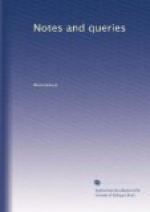G.H.B.
“Talk not of Love” (Vol. iii., p. 7.).—The song quoted by your Querist, A. M., was written by Mrs. MacLehose, the “Clarinda” of Burns, and is to be found in most of the lives of the Scottish poet.
[J.H., JR., says it is printed in Chambers’s Journal, No. 1. New Series. DANIEL FERGUSON points them out at p. 212. of a Collection of Songs of England and Scotland, published by Cochrane, of Waterloo Place; and in vol. ii. of Johnson’s Scots Musical Museum; and G.T. also refers to the last-named collection.]
The Butcher Duke (Vol. iii., p. 8.).—The song referred to by MEZZOTINTO is to be found in most of the collections of Scotch songs, under the name of “Bonnie Laddie, Highland Laddie,” for which old air it was written; or, when only partially printed, by the commencing line of one of its stanzas:—
“Geordie sits in Charlie’s chair.”
It is one of the numerous Jacobite songs composed either about 1715, by some one “out in the Fifteen,” or later by a poet of “the Forty-five.” The author’s name is unknown. In the collection of Scottish songs, published by Robert Chambers in 1829, the song, consisting of no less than twenty-two stanzas, will be found at p. 367.
[L.M.M.R. has also kindly transcribed the song from the Scots Musical Museum; and DR. C., of Newcastle, who says “it is well known in the remoter districts of Northumberland,” obligingly offers to furnish MEZZOTINTO with a copy, if he should desire it.]
Curfew (Vol. ii., p. 103.).—The Curfew is rung at Handsworth, near Sheffield.
H.J.
Robertson Struan (Vol. iii., p. 40.).—As one of those who quarter the coat of Robertson Struan, I may perhaps be able to afford C.R.M. some slight information. My maternal grandfather was a son of William Robertson, of Richmond, one of whose daughters married Sir David Dundas, Bart. The arms borne by him were, Gules, three wolves’ heads erased, langued, azure. A selvage man in chains hanging beneath the shield. Crest, a bare cubit, supporting a regal Crown. Motto, “Virtutis Gloriae Merces.”
W.J. BERNHARD SMITH.
Temple.
* * * * *
MISCELLANEOUS.
NOTES ON BOOKS, SALES, CATALOGUES, ETC.
The landing of Charles Edward Stuart, and the “Seven Men of Moidart,” on the memorable 25th July, 1745, was the opening of the last, and, in many respects, the most brilliant and stirring chapter in the Romance of English History. That Mr. Murray has therefore done wisely in the publication, in a separate form, of The Forty-Five: by Lord Mahon, being the Narrative of the Insurrection of 1745, extracted from Lord Mahon’s History of England, there can be little doubt. The memory of that eventful period is so kept alive among us, by snatches of Jacobite




